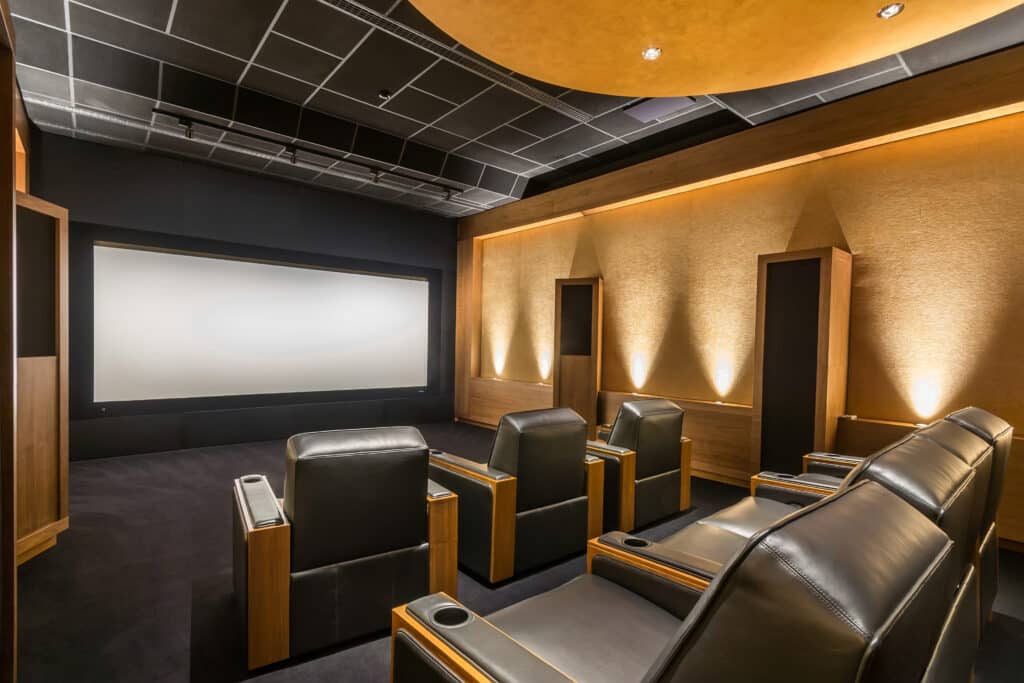If you have a home theater or are thinking of creating one, it’s common to dream of a perfect audio experience. However, achieving that level of audio perfection can often feel like a puzzle with too many pieces. From the annoying echo of some theater rooms to the frustration of sound leaking out and disturbing the peace of your household, there are many obstacles to overcome. Soundproofing might not be a cure-all solution, but it can certainly help bring you closer to the ideal sound experience for your home theater. Below, we’ll discuss the basics of soundproofing your home theater and provide some tips to help you get started.
What is Home Theater Soundproofing
Home theater soundproofing is an acoustic solution that reduces or eliminates sound transmission from one room to another. This means preventing sound from escaping your theater room and stopping outside noise from entering. The goal is to create a controlled listening environment where only the desired audio is heard without any other noise. Good soundproofing improves the clarity and quality of sound, making movies, music, and games feel more engaging and realistic.
At its core, the acoustics of a home theater is a science. It involves factors like the direction of sound waves, room materials, and methods to control transmission or absorb reflections. Soundproofing a home theater is a multi-step process that typically involves selecting the right materials to create an immersive sound landscape. That being said, homeowners often wonder if soundproofing is really worth it.
Why Soundproof Your Home Theater?
If you are on the fence about soundproofing your home theater or are looking for some motivation to get started, here are a few reasons why it can be a great investment.
- Enhanced Sound Quality: One primary reason for soundproofing is to improve the audio experience in your home theater. By reducing outside noise and echo, you can create a more immersive listening environment that brings out the full potential of your speakers and subwoofer. This means better sound quality, clearer dialogue, and improved bass response. This can make movie conversations more impactful, concert recordings more life-like, and games more engaging.
- Better Privacy: Soundproofing can provide much-needed privacy if you live close to your neighbors. It can prevent sound from escaping the room and disturbing others, allowing you to enjoy music or movies at any time without worrying about complaints. This is perfect for small theater rooms or families with kids who enjoy late-night movie marathons or gaming sessions since it won’t disturb others in the house.
- Increased Property Value: Soundproofing your home theater can also be seen as a valuable improvement to your property. It adds a level of sophistication and luxury, making it an attractive selling point for potential buyers. Soundproofing, coupled with a surround sound system, can make your home theater an impressive feature that sets your property apart from others in the market.
- Reduced External Noise: Outside noise, whether from traffic, loud neighbors, or barking dogs, can be a major distraction when trying to enjoy a movie or show. Soundproofing your home theater can reduce the amount of external noise entering the room, allowing you to fully lose yourself in the entertainment experience without interruptions.
Soundproofing a home theater not only makes it a more enjoyable and convenient space but also adds value to your home. With the growing popularity of at-home entertainment, investing in soundproofing can be worthwhile in the long run.
Different Types of Soundproofing
Before you start soundproofing your home theater, it’s important to understand the different materials that can be used. Some popular options include:
- Acoustic Foam Panels: These are lightweight and easy to install, making them a popular choice for soundproofing. They work by absorbing sound waves, reducing echo and reverberation in the room.
- Mass Loaded Vinyl (MLV): This material is heavy and dense, making it an effective sound blocker. It can be installed in walls, floors, or ceilings to reduce sound transmission.
- Green Glue: This is a popular noise-proofing compound that can be used between layers of drywall, wood, or other building materials. It works by converting sound energy into heat energy, reducing noise transfer.
- Cork: This natural material is often used as a flooring option in home theaters. Its soft and porous nature helps absorb sound and reduce echo in the room.
- Resilient Channels: These metal strips can be attached to walls or ceilings before installing drywall. The channels help prevent direct contact between the drywall and studs, reducing sound transfer.
- Bass Traps: These devices are specifically designed to absorb low-frequency sounds, such as those produced by bass-heavy music or movies. They can be placed in corners of the room to reduce bass vibrations and improve overall sound quality.
When choosing soundproofing materials, consider factors such as cost, effectiveness, and ease of installation. Soundproofing techniques will differ if a house is being built from scratch versus soundproofing an existing room. We recommend consulting with an audio professional to determine the best materials and techniques for your specific situation.
Soundproofing For Homes Being Built or Renovated
Soundproofing can be incorporated into the construction process for new houses or major renovations. This includes adding extra insulation in walls and ceilings, using soundproof drywall or double-layered drywall, and sealing any gaps or cracks to prevent noise from seeping through.
Additionally, choosing materials with high sound transmission class (STC) ratings can greatly reduce noise transfer. STC ratings measure a material’s ability to block sound, with higher ratings being more effective. For example, standard drywall typically has an STC rating of 40-45, while thicker materials like soundproof drywall or mass-loaded vinyl can have ratings as high as 60-75.
A contractor or audio professional can also help determine the best placement of windows and doors to minimize noise transfer. Using double-paned or laminated glass for windows can also reduce sound transmission.
Soundproofing during the construction process is ideal as it allows for easier installation and room setup. However, it can still be done in existing homes with some modifications and effort.
Soundproofing for Existing Home Theaters
If you are not building a new home, there are still ways to soundproof existing rooms for home theaters or music studios. Some options include:
- Soundproofing Foam Panels: These can be easily installed on walls and ceilings to absorb sound and reduce echo.
- Acoustic Panels: Similar to foam panels, acoustic panels come in a variety of styles and can help reduce sound reflections.
- Soundproofing Curtains or Drapes: These thick, heavy curtains can help block out external noise while adding a stylish touch to the room.
- Sealing Gaps and Cracks: This should be done before other soundproofing measures are taken. Use caulk or other sealants to seal any openings where sound can leak through.
- Adding mass: Layering thick materials on walls, such as additional drywall or mass-loaded vinyl, can greatly improve soundproofing.
- Installing a door sweep: This will help seal any gaps between the bottom of the door and the floor.
While these methods may not achieve the same level of soundproofing as during the construction process, they can still greatly improve the acoustics in an existing home theater. Besides soundproofing, investing in a hi-fi audio system and quality speakers can also help transform a room into a theater-like experience.
Improve Your Home Theater Experience with AIS
If you want to improve your home theater experience or want to build a home theater in your new home, AIS can help. Our team of professionals can help you design a custom home theater system that meets your unique needs and budget. We also offer professional installation services to ensure that your home theater is set up correctly for optimal sound quality. With our top-of-the-line audio equipment and expert knowledge, we can help you achieve the best possible sound experience in your home theater. Want to learn more about our home theater services? Contact us or use our budget calculator to plan for expenses.




